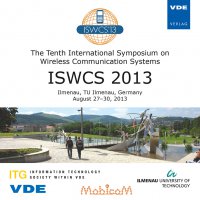Sparse IR-UWB Channel Identification Based on Successive Relaxations and Least Squares Estimation
Conference: ISWCS 2013 - The Tenth International Symposium on Wireless Communication Systems
08/27/2013 - 08/30/2013 at Ilmenau, Deutschland
Proceedings: ISWCS 2013
Pages: 5Language: englishTyp: PDF
Personal VDE Members are entitled to a 10% discount on this title
Authors:
Torturela, Alexandre de M.; Medina, César A.; Sampaio-Neto, Raimundo (Pontifical Catholic University of Rio de Janeiro, Brazil)
Lamare, Rodrigo C. de (University of York, UK)
Abstract:
In this article, a simple method for sparse impulseradio ultra-wideband (IR-UWB) channel estimation is presented. The aim of the proposed method is to find a sparse channel estimate by making successive relaxations of the full-rank channel estimate. The idea of relaxation is to build a new vector by zeroing, in a successive and appropriate fashion, one or more elements of the full-rank least squares estimate, until the cost function exceeds an appropriate threshold. This is done while the least squares estimate associated with the reduced support (set of the indexes of the nonzero elements) of the vector is computed. This procedure is successively repeated until there is no further reduction in the cardinality of the support. The proposed algorithm can incorporate any technique for computing least squares estimates. Simulation results show that a significant convergence performance improvement of the proposed method over the conventional least squares solution with or without the l1- norm penalty. For an SNR equal to 20dB and 25dB, the proposed method approaches the performance of the oracle least squares solution for over 96% and 98% of the realizations, respectively.


